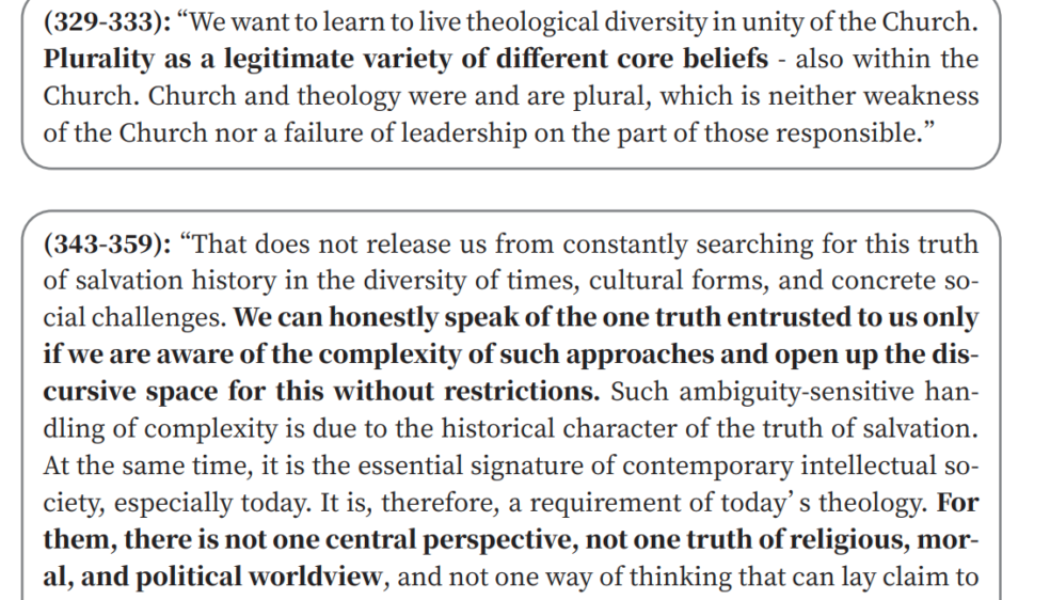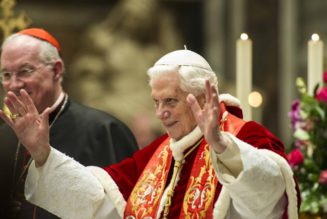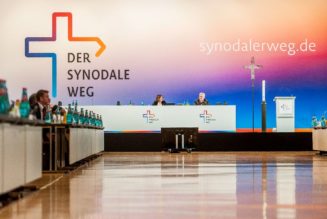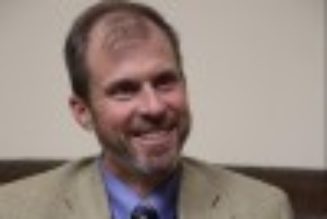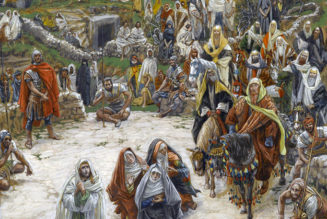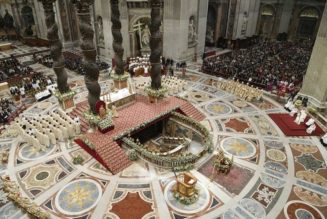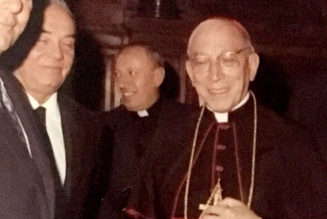(Above, a rainbow flag at the altar in a queer mass celebrated this past spring in Munich by Cardinal Reinhard Marx, who now says homosexuality is not a sin.)
A friend in the US sent me today this link to an UnHerd piece describing Germany as “Europe’s bordello,” because “industrialized prostitution” and sex trafficking is out of control in that country. How are the country’s Catholic bishops addressing the crisis? By disassembling the Church’s teachings on sexual morality as fast as they can.
Not all of the German Catholic laity are sitting by idly while their bishops implode the Church. The group New Beginning is trying to alert Catholics around the world about what’s happening in their country, in partial hope that the deceit and corruption doesn’t spread beyond Germany’s borders. Here’s a link to their website. The group claims that this is a coup against Catholicism by corrupt episcopal elites, with most Catholics either kept out of the process, or choosing to stay away because they feel powerless to change anything. From the site (emphasis in the original):
Very few Catholics in Germany, let alone worldwide, have worked their way through the piles of paper presented and decided in the name of a much-quoted „reform“ and under the pretext of pursuing the reappraisal of the abuse scandal. Although the desires of „the faithful“ and their wishes for reforms are allegedly discussed there, very few Catholics participate in this debate, which is mainly pushed forward by Church officials. Quite a few Catholics in Germany also consciously turn away because they want nothing to do with it and are not heard anyway.
They say that most German bishops are doing bad things under cover of confusion and bureaucracy. So:
As an initiative of the Catholic laity, we have decided to bring light into the darkness of the countless foundational and implementation texts. We have written a compilation of the essential topics and quotations from the orientation text and all four forums of the Synodal Path for you and all interested parties. Everything has been translated into several languages. (Spanish, English, Italian). You will find the texts below under this link in the respective languages available for download. We let the texts speak for themselves, which brings more clarity and transparency than the media interpretations that circulate and are widely disseminated. Just read for yourself what is really decided on the German Synodal Path!
Dear Bishops and Cardinals, we ask you: Read the summaries of the original quotations from the decisions of the German Synodal Path and, if you consider it necessary, give your view on it. As Catholic laity in Germany, we want to preserve the unity of the universal Church and ask for your prayers and support.
What New Beginning is doing is translating the German bishops own words, and disseminating them, so Catholics around the world can know what these bishops are doing. It is truly shocking. For example, this official statement from the bishops about the Synodal Path’s reforms makes it clear that the grounds on which they are negating long-established, authoritative Catholic teaching:
(30) “Reforms are an integral part of the tradition: Worship is changing; the doctrine develops; Caritas unfolds. In its dynamics, tradition is the process of
examining the current form of the Church and the faith to receive and shape it ever anew as a gift from God. The tradition of the Church is open to the
context of new discoveries, new insights, and new experiences that challenge traditional faith and call for new responses that testify more deeply the revealed truth of God, serve the growth of the Church, the proclamation of the Gospel and communion with all people to whom God’s grace applies. The philosophy and wisdom of the peoples, science and the arts, the life of the people, and the social work of the Church were and are inspiring factors for the further development and ever-new unfolding of the tradition. Prophetic voices are found not only within but also outside the Church. People’s living conditions and attitudes change over time; these changes are shaped by tradition and help shape it.”
Traditional Anglicans, Episcopalians, and trads within other Mainline Protestant traditions will know exactly what’s going on here. It’s the naked assertion that the Spirit Of What’s Happening Now is more important than the Holy Spirit, as expressed through Scripture and authoritative Tradition.
Take a look at these passages from Synodal documents (again, emphasis is from New Beginning):
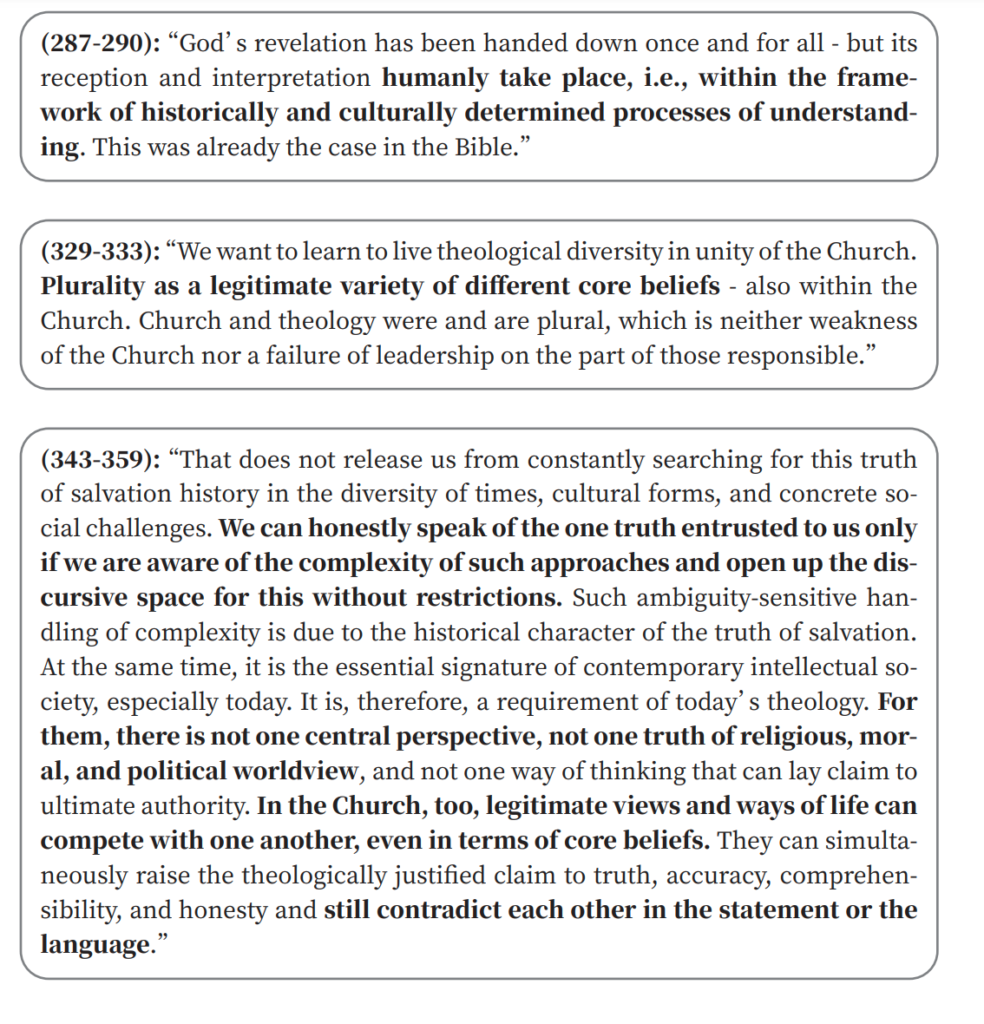
In straightforward language, the German bishops are denying truth. They are trying to create space for radical theological dissent within the Catholic Church. When they gain full power, of course, they will close that space off. This is the experience of almost every church that has been taken over by progressives. This is a very familiar trap to traditionalist Protestants within the Mainline. In any case, it is patently absurd for Catholic bishops — Catholic bishops! — to claim that there is a “legitimate variety of different core beliefs” within Catholicism. That claim strikes at the very heart of what it means to be Catholic, in the sense of being under the authority of the Pope, the bishops, and the Magisterium (teaching authority).
The Synod expresses a desire to redefine the priesthood from a sacramental model to a Protestant preaching model. That is, they want the main function of priests to be proclaiming the Word, not celebrating the Mass. And they want women priests, and God-knows-what-else priests:
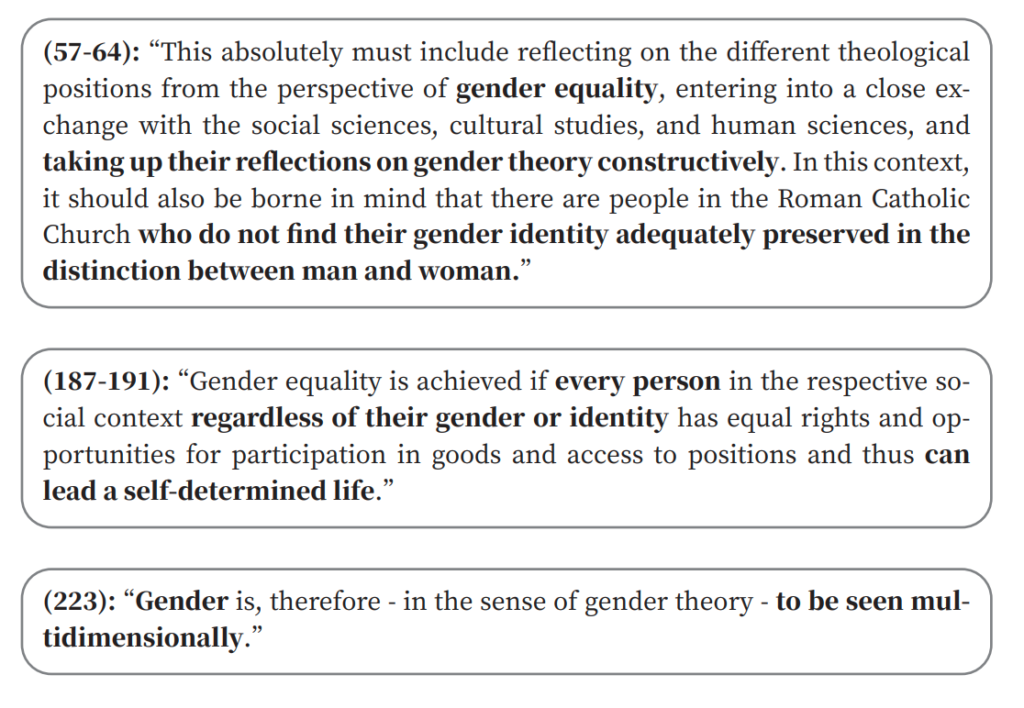
More here; “Ordinatio sacerdotalis” was Pope John Paul II’s definitive ruling out, once and for all, the ordination of women to the priesthood:
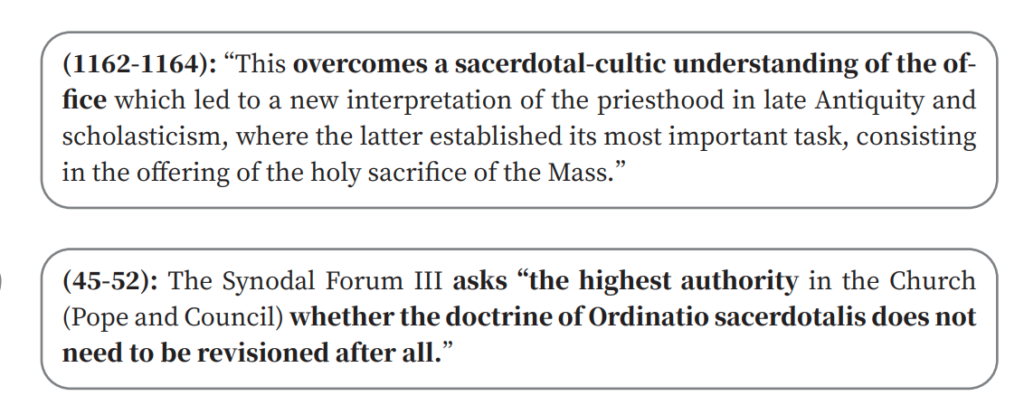
Finally, if you don’t agree with the revisionist progressives? Well, forget that talk about a plurality of truths:

This is mostly about sex, of course. It always is. Download this PDF translation of some Synodal statements on sexuality. Among them:

The audacity of these people! To claim that Catholic sexual teaching compelled priests to molest and sodomize children and minors, especially boys! It is obscene, just obscene. But there’s more:
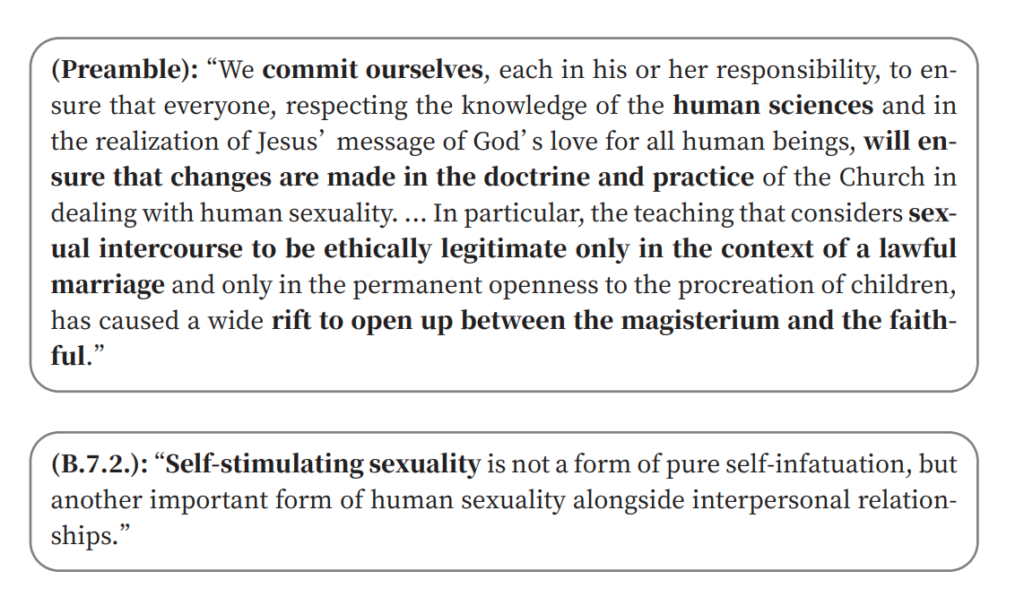
They vow to work to overturn the Church’s teaching on sex and marriage. They’ve even proposing to legitimize pounding one’s Panzer. And:

This is a lie on two fronts. First, this brazen claim that homosexuality is not a risk factor for sexual abuse is, of course, the official story of the media, but it flies completely in the face of the facts. In the US, for example, the John Jay report found that over 80 percent of abuse victims were male. Moreover, homosexual networks existed throughout seminaries and clerical systems, which, while not necessarily causing abuse, nevertheless made it hard for those priests compromised by gay sex to speak out against abusers of minors. The late Richard Sipe was a church liberal, and the foremost scholar of clerical sexual behavior. He told me on the record, back in 2002, that gay men should not be admitted to seminary, not because gay men could not make good priests — again, he was a liberal — but for their own protection. The networks were so pervasive, and so aggressive, that a man with same-sex attraction would find it very difficult to maintain chastity. And if he fell, even once, he will have been “tamed,” said Sipe — that is, the predators within the network would know that they didn’t have to worry about him challenging them, because he was blackmailable.
To be clear: to be gay does not mean one is an abuser! Nor, obviously, are heterosexuals free from this sin and this criminal disposition. But it is simply a lie to claim that homosexuality in the Catholic priesthood had nothing to do with the abuse scandal. That said, even if it were true that homosexuality is not a risk factor for sexual abuse, that would in no way mean, logically, that the Catholic Church needs to change its teaching on sexuality. The Bible doesn’t say what it does about homosexuality because gays are at risk of sexually abusing children. I am 100 percent confident that the Synodal participants know this. They are simply trying to use this deceptive logic to force through the overturning of Catholic teaching.
More:
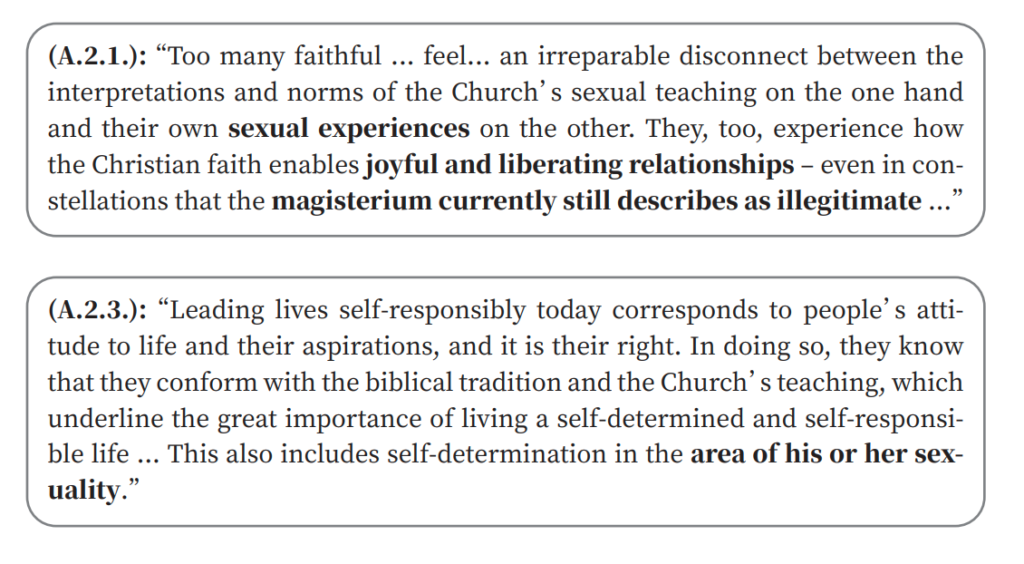
The German Catholic bishops who accept this Synodal path wish to claim that the Church has no legitimate authority to proclaim sexual teaching. That sex is the business of the autonomous individual. Because see, some laity feel that their sexual relationships are “joyful and liberating,” and those feelings trump Biblical truth. I can just imagine the German Catholic bishops telling Moses, arriving from the summit of Sinai, that the Israelites feel an irreparable disconnect between the interpretations and norms of Mosaic teaching on the one hand, and their own joyful and liberating religious experiences worshiping a golden calf on the other.
And yes, they’re going to queer the Church publicly, instead of just behind the scenes:
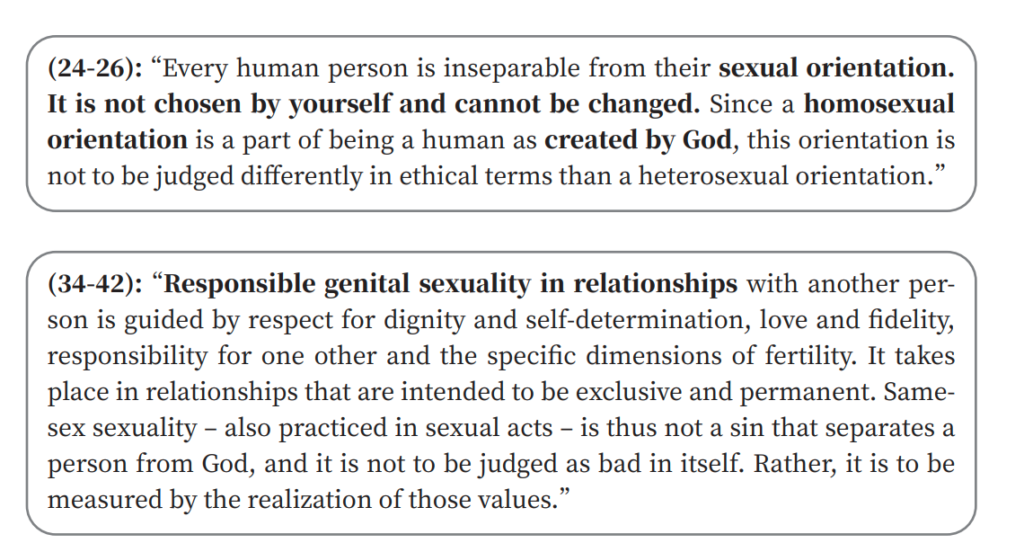
There it is. A bright red line. What the Bible says is a sin, and what the Catholic Church has considered to be sinful for almost two thousand years, is — presto change-o! — no longer a sin. So say German bishops. And if anybody in the German church tries to hire and fire based on what the Catholic Church teaches:

And:

New Beginning also has translated media interviews with key Synod officials. Here, for example, is a piece of an interview with Helmut Dieser, the Bishop of Aachen:
You recently said that homosexuality is willed by God. What do you mean by that?
Bishop Dieser: Homosexuality is ‐ as science shows ‐ not a mishap, not a disease, not an expression
of a deficit, nor, for that matter, a consequence of original sin. Then I must say: The world is colorful,
and creation is diverse. And then I may also accept a diversity in the area of sexuality, which is
wanted by God and does not violate the Creator’s will.God actually has nothing against a man loving a man or a woman loving a woman?
Bishop Dieser: Same‐sex feeling and loving is not an aberration, but a variant of human sexuality.
Here are excerpts from a Stern interview with Cardinal Reinhard Marx, the Archbishop of Munich, from this past March, translated by New Beginning:
In your position as archbishop, and as the first cardinal, you celebrated a queer church service. Wasn’t homosexuality until recently considered a sin by the church?
Marx: Homosexuality is not a sin. It shows a Christian attitude when two people, regardless of their gender, stand up for each other in both joy and sorrow. I am talking about the primacy of love, especially in sexual encounters. Though I must admit that ten or fifteen years ago, I would not have imagined myself celebrating a church service this way. Now, I was very much looking forward to it.
Why now?
Marx: In the archdiocese, we have been trying for years to find opportunities to include queer people. For 20 years, there has been this queer Catholic community holding church services on a regular basis. They invited me to attend this anniversary. They had experienced hostilities, and to me it had become important for them to find a home in the church.
A cardinal with a rainbow flag at the altar must be a provocation to many conservatives. Has Rome already contacted you?
Marx: I have received quite a few letters on this subject in recent years but I think I am doing the right thing. For years now, I have felt freer about expressing my thoughts and I want to bring forward the church doctrine. The church is changing with the times, too: LGBTQ+ people are part of creation and loved by God and all of us are called to stand up against discrimination. Maybe the church is slower in some regards but this development is happening everywhere. Just a few years ago, most companies would not have accepted openly homosexual board members.
No company had homosexuality defined as a sin in their company statutes.
Marx: Why are you talking about sin all the time? This is about the quality of relationships. [Emphasis mine — RD] There are some in church who have not yet sufficiently discussed this question, you are right about that. But sin means turning away from God, turning away from the Gospel, and you cannot assume that of all those who are living in same-sex relationships and then even say: away with them.
Please explain how homosexual, queer or transgender people ought to be integrated into Catholic doctrine.
Marx: An inclusive ethics that we have in mind is not a more lax one – as some claim. This is about something else: meeting at eye level, respecting the other person. The value of love is shown in the relationship: by not turning the other person into an object, by not using or humiliating the other person, by being faithful to each other, and reliable. The Catechism is not set in stone. One is allowed to doubt what is in there. We discussed these questions during the family synod but were reluctant to put anything in writing. Even back then, I said: There are people living in an intimate and loving relationship which also has a sexual expression. And we are to say this has no value? Sure, there are people who insist on seeing sexuality as something limited to procreation but what do they tell people who can’t have children? Anyway, I do feel a bit strange talking too much about the details of sexuality…
The cardinal goes on to complain that the interviewer doesn’t want to ask him about other Christian teachings, but then admits that there’s not much interest in discussing the Incarnation and other topics. He’s right about that, but it’s also true that if Cardinal Marx is correct that a 2,000-year-old moral teaching of the Church, one that is firmly grounded in Scripture, and which is based most deeply in the Bible’s model of the human person, can be overturned by a vote of the bishops, then who cares what they have to say about the Incarnation or anything else? They will have shown that the Catholic Church’s claim to magisterial authority is nonsense.
It seems clear to me that the institutional German Catholic Church is in schism. And not only to me, but to the New Beginning people. They issued a press release after the September meeting of the Synodal Path, saying, in part:
The initiative “New Beginning” sees in the 4th Plenary Assembly of the Synodal Path the birth of a German national church. On July 21, the Holy See had still stated unequivocally: “The ‘Synodal Path’ in Germany is not authorized to commit the bishops and the faithful to the adoption of new forms of governance and new orientations of doctrine and morals.” Today we know: The synodals, together with the majority of the German bishops, violated this directive in spirit and letter and even with declared intention. They agreed to texts in which the Church’s magisterium is undermined, episcopal authority is undermined, and the Church’s continuous teaching on Christian anthropology (“created as man and woman”), on love, marriage, and sexuality is destroyed. Even more, the Presidium announced that it would not respect the negative vote against the basic text on Forum IV, “Living in Successful Relationships.”
After the paper, which in a scandalous way elevates homosexual and bisexual practice morally and theologically to the rank of a norm variant of human sexuality, was brought down in the vote by 21 courageous bishops, several bishops declared ‐ against every synodality and every understanding of democracy ‐ that they would nevertheless continue to orient themselves in their dioceses to the rejected draft. Bishop Georg Bätzing announced on his own that he would nevertheless introduce the text into the worldwide synodal process and also submit it for the ad limina visit of the German bishops in Rome. We ask: What is the point of debates and votes on the Synodal Path from now on, if every “unwanted” result is simply ignored ‐ and that even by the president of the German
Bishops’ Conference?
More:
Some bishops (including the president of the German Bishops’ Conference) have already announced that even if their “proposals” are rejected in Rome, they still want to create facts in their dioceses through practical implementation. The “testimony of unity with which the Body of the Church manifests its fidelity to Christ the Lord,” as the Holy See’s declaration states, is being trampled underfoot with announcement. Next to the “Roman Catholic” there is a new “German Catholic.
The faithful, who identify with the binding faith of the Church, are henceforth left alone by the majority of the German bishops. How are they supposed to trust “their” bishops when the majority of them deny the truths to be believed by virtue of the divine and catholic faith and have thus severely damaged, if not broken (cf. 751 CIC), the communion with the universal Church?
The current decisions put above all the priests in a precarious situation: Already if a priest or religious teacher represents the binding ethics of the Church, if he stands up for it in catechesis and preaching, he immediately goes into the ecclesiastical “out” in the horizon of the Synodal Path and is even released for discipline.
Subscribe Today
Get weekly emails in your inbox
Here is a link to the New Beginning website, where you can find all this information and much more. If you browse with Chrome, it will automatically translate the German. I think they must have an English mode too. Thank God for these courageous Catholics. The Catholic Church in Germany is perhaps the richest national Catholic church in the world. A few years back, the Catholic writer Phil Lawler explained why this is, and why it is corrupting. Excerpt:
Consider first the money that flows into the Catholic Church—not because the faithful toss money in collection plates at Mass, but because they are required by law to pay a percentage of their income to the Church. German law stipulates that if someone is registered as a member of a religious congregation, he must pay the “church tax”—which is collected by the government. Thus the wealth of the Catholic Church in Germany comes directly from the government, and only indirectly from the faithful. Right away the potential for corruption—for bending Church policies to ensure smooth dealings with the government—should be obvious.
Notice, too, that when I say that the funds come indirectly from the “faithful,” I am using that term loosely. A German citizen is obligated to pay the ‘church tax’ whether or not he is actively involved in his religious community. Anyone who is registered as a Catholic, whether or not he ever shows up in a parish church, is obligated to pay.
This curious policy has two results. First, the Catholic Church has enormous financial power. Second, the Catholic hierarchy has a clear and compelling incentive to maximize the number of people who are registered as Catholics—whether or not they practice their faith.
The financial wealth of the Church in Germany is staggering. The ‘church tax’ has brought in more than €5 billion ( $5.3 billion) in each of the last three years, with actual revenue trending upward. That enormous income allows the German hierarchy to sponsor a wide range of medical, educational, and social programs. In fact the Catholic Church is the country’s 2nd-largest employer, behind only the government!
Last year the world heard a great deal about the “Bishop of Bling”: Bishop Franz-Peter Tebartz van Elst, who resigned his post as head of the Limburg diocese after being criticized for spending $43 million to remodel his residence and diocesan headquarters. But the truth is that his pattern of spending is not radically different from that of other German prelates. Just for example, Cardinal Reinhard Marx of Munich, the president of the German bishops’ conference and a member of the Pope’s Council of Cardinals, has spent a whopping $186 million on his own new archdiocesan headquarters.
A German cardinal can command a salary of about $16,000 a month—roughly three times what his American counterpart would receive. That figure does not include his residence, automobile, food, health care, and travel expenses, all of which are covered. In short a German prelate receives the sort of compensation one might expect for a senior corporate executive—which, in a real sense, he is. But there is a crucial difference: the prelate is paid by the state.
The state pays, however, only because citizens register as Catholics. If the number of registered Catholics drops, so too does the compensation for bishops, and the government support for Church-sponsored programs. Thus the bishops look askance at Catholics who do not register their church affiliation. As a matter of fact, the German hierarchy has taken steps to deny the sacraments to unregistered Catholics.
This situation cannot last.
Join Our Telegram Group : Salvation & Prosperity
